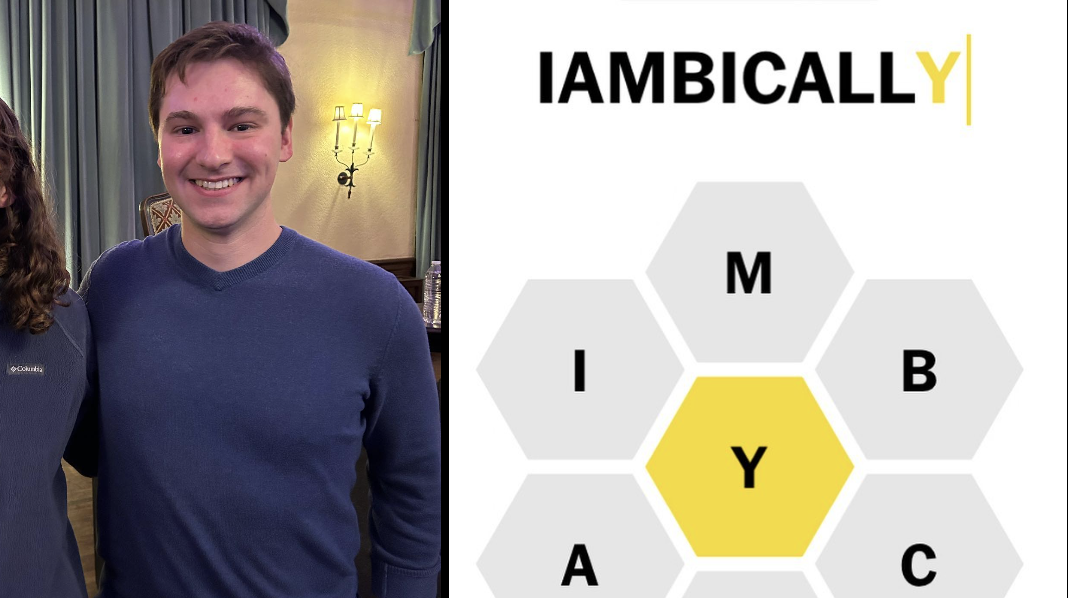Sam Ezersky is the editor of the New York Times word puzzle Spelling Bee which has captivated the minds of many players with its honeycomb shape grid and its deceptively simple game play.
The proud Baltimore-born Sam Ezersky has been the man behind Spelling Bee for around 4 years and it is something he plans to do for a lot longer if given the chance. He is the son of Alan Ezersky and currently resides in New York City, NY. Sam has been involved with puzzles since at least 2012 where he published his first puzzle in LA Crossword, a few months later he also got published in NYT Crossword, the puzzle was co-authored with Victor Fleming. Getting into real crosswords has made it possible for Sam to connect with his crossword hero Will Shortz.
Sam first got into puzzle solving when he was around 6 or 7 years og age. He was at a barbershop and noticed an incomplete Puzzle in a magazine laying on the table. While waiting for his turn he started messing with it and was fascinated by the puzzle logic, there was no clues instead all the answers were alphabetized by their length, the word inter-locking seemed such a cool concept for the young Sam, even though he did not understand what most of the words meant.
“Fill-It-In” was basically a clueless crossword, consisting of just words that you put in the grid.
Completing the grid completely made him love the experience even more so much so, he still remembers parts of it. More than 18 years have passed since then and Sam’s love for puzzle solving has never waned.
From Crossword to SB
Not long ago the words Spelling Bee was associated with school kids competing on Scripps Spelling Bee competitions, on spelling difficult words ‘sfprfuul’ or ‘nalicbekre’. Now Spelling Bee refers to the addictive NY Times puzzle which is played by so many people daily nearly becoming a nation wide obsession for word nerds.
The 28-year-old Sam went to JCC (Jewish Community Center) at a young age and by High School began sending Will Shortz puzzles which were politely rejected several times. Eventually Sam got the attention of Shortz and got published. The first NYT puzzle is framed in his home office along with the acceptance letter and a copy of the check you get as a reward for being published.
Getting hired by the NY Times
In 2017 Sam, freshly out of college was actually hired by the Times as a co-editor for the crossword puzzles. He worked alongside 3 other crossword editors at the time. At the beginning of this it meant Sam had to evaluate, read and edit submitted crosswords, so he had to make them conform to a set of standards regarding clarity, style and of course remain fun to solve. This is something Sam is still does to this date.
A new game was being discussed and in 2018 Sam was told about the now famous Spelling Bee. A honeycomb short puzzle which would challenge you to create as many words as possible from the grid of letters. Sam was proposed the role of being the game editor, and Sam accepted despite the fact that it seemed such a tiny task for him and not something that would define his career.
It later turned out to be the opposite because by the end of 2019 and start of 2020 he realized that the spelling bee was becoming sort of a big deal with an ever increasing popularity and there was a few spelling bee helper sites to help players solve the game when stuck. The puzzles are not made from scratch, he chooses the puzzle from a database and tries to select such words that would make the puzzle as fun as possible for the players, fun to play and not frustratingly difficult. Sometimes when the puzzle lacks clarity or the pangrams are more than a few is not uncommon for twitter to be flooded with people complaining about it.
The Increase in Popularity
Spelling bee might have taken off because of the pandemic where people were bored and looking for some fun time passer during the lockdown – the game is also a diversion from the grim world of negative news around us. It is also a get-together kind of game because as you encounter difficulties you are more likely to ask people around you for help or ideas so it increases the social interactions and could bring people together, to discuss, enjoy, solve, compete or complain (lol).

